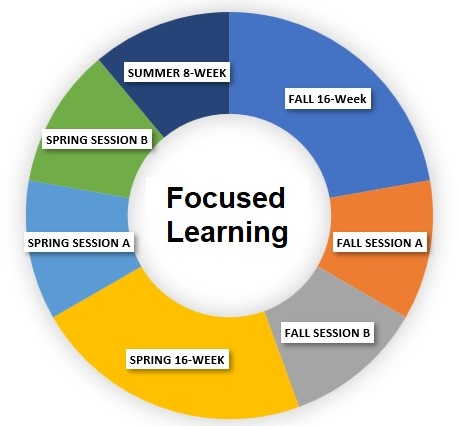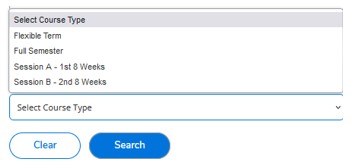8-Week Sessions
Resources

Focusing on Student Success
North Central State College has adopted new fast-paced sessions offering 8-week courses during fall, spring, and summer semesters. You’ll be able to gain academic momentum by completing courses in less time and earn your degree faster.
- Finish a class in 8 weeks, rather than the traditional 16 weeks.
- Concentrate on fewer classes at the same time.
- Complete more credits each semester, and earn your degree faster.
- Take the next course in a sequence in Session B, rather than waiting until the next semester.
Each academic year at NC State will include five 8-week sessions: one in summer, two in fall, and two in spring. There will be a short break in between each of these 8-week sessions.
Frequently Asked Questions
-
Eight-week sessions are all about student success and are focused toward completion. Classes offered in this format will have longer class periods, but will meet for only 8 weeks, instead of the normal 16 weeks. Advantages for students may include:
- Improved course success since students can concentrate on fewer classes at one time.
- Ability to complete more classes in one term by taking some in Session A and some in B.
- Enhanced connection with faculty.
- Quicker degree completion.
-
The 8-week format is all about student success. Data shows increases in course success rates, persistence from semester to semester, and graduation rates when students can finish courses quicker. 8-week classes also allow for longer class periods in a shorter timeframe which enhances the student/faculty connection.
NC State started in Fall 2022 with all general education courses (English, math, psychology, sociology, humanities, statistics, etc.) offered only in the 8-week format, while core classes for each major still mostly remained in the 16-week format. The college does plan to convert more courses to the 8-week format, however some may never convert to 8-weeks.
-
You will register for 16-week, Session A, and Session B classes at the same time during the normal semester registration period.
Once online registration closes (usually after the first day of the semester), all registrations must be handled using the Late Registration paper-pencil form which is processed through the Student Records Office.
-
When possible, students should take a maximum of three classes at one time – two classes in each 8-week session plus one 16-week class or two 16-week classes plus one 8-week class per session. A student can take a maximum of 9 semester credits in an 8-week session, but your total number of semester credits cannot exceed 21.
-
8-week Session A and Session B classes will be identified with the Course Type of either Session A – 1st 8 weeks or Session B 2nd 8 weeks.

-
Full-time students can maintain their current course load each semester, but spread out most general education courses over two-8 week sessions.
This means for example, that a student could take their English course in Session A and their required math in Session B and concentrate on each subject more fully.
-
8-week courses allow part-time students to focus on one or two courses at one time while being able to earn more credit hours each semester.
-
Full-time status is achieved by taking at least 12 semester credits in a long semester (combination of 16-week, Session A, and Session B 8-week classes). As long as you register for a combined total of 12 credit hours, you will still be a full-time student.
-
No. If you currently take only 12 semester credits in one semester, you will only need to take 12 semester credits per semester. Instead of taking four classes at the same time, you will only be taking one or two classes in Session A and one or two classes in Session B, along with 16-week courses for a total of four classes in the semester.
-
Yes, the core classes for most of our programs are still being offered in the 16-week format. Our general education courses, such as English, math, sociology, or psychology are offered in the 8-week format. Therefore, it will be important for students to equalize their schedule by choosing a balanced number of Session A, Session B, and 16-week classes.
For example:
One 16-week course
Two Session A courses
Two Session B coursesor
Two 16-week courses
One Session A course
One Session B course -
100% refund, 50% refund, and last day to withdraw dates for 8-week and 16-week sessions can be found at Refund and Withdraw Dates, opens in a new window.
-
The semester credit hours for your classes will not change. If you take two 3-credit-hour classes in an 8-week format, you will earn 6 credit hours.
-
You can choose if the course offers both options, however many will only be offered either in the 8-week or the 16-week format. General education courses will only be offered in the 8-week format while many of your core classes for programs may only be offered in the 16-week format.
Pay close attention to the start and end dates of each course when choosing your sections as you still want a well balanced course load.
-
Yes. If you are using financial aid, we especially advise that students enroll in both 8-week sessions and any 16-week classes prior to the start of the semester. Classes added after the start of the semester may not be applied towards your financial aid. You can (and should) contact your Academic Advisor if you plan to make changes to your schedule.
-
To add classes, starting Monday of week 2 of the semester, students must complete the DROP/ADD FORM (PDF), opens in a new window to register for a Session B class. However, classes added during this time must be paid for out-of-pocket and cannot be applied towards your financial aid.
-
Yes, if the failed course in Session A was a pre-requisite to a registered Session B course, you will be dropped from the Session B course. If offered in Session B, you may be given the option to re-enroll in the failed course in Session B to improve overall GPA and not lose momentum.
-
We encourage you to reach out to your assigned Success Coach or Academic Liaison to explore the course schedules specific to your program.
If you have other questions, please email us at studentsuccess@ncstatecollege.edu, opens in a new window.
-
Books/Supplies can be purchased against excess financial aid online at the bookstore’s website approx. 3 weeks before the start of the semester. In person bookstore charges against excess financial aid begin the week before the start of the semester. ALL books/supplies must be purchased against financial aid within the first two weeks of the semester, regardless of whether you are enrolled in A, B, or full-term courses. You cannot use financial aid for bookstore purchases later in the semester. There is not a separate book charge window for strictly Session B courses. See the Campus Bookstore information for more details.
-
All courses need to be paid for no later than the published Last Day to Pay Fees date. If registering after Last Day to Pay Fees, fees are due at the time of registration.
-
Financial aid disbursements may be delayed if you have a class that begins in B session, as attendance in B session must be confirmed before eligible aid for that class(es) can be disbursed.
-
Dropping or failing courses, at any point in the semester, may impact your financial aid eligibility. Please see the Financial Aid Office if you need information on how these decisions may impact your aid.
-
VA educational benefits may be impacted by 8 week courses. The VA can let a student know how it may be impacted as they are the ones who determine how much a student receives in funding. The VA does not correspond with the college about payments they issue to students. Students must contact the VA with any questions and concerns.
-
No. Between in person and online activities, you can expect the same amount of total class time guided by your instructor to be the same in an 8-week session as it is in 16 weeks. For example, if your class would meet 4 hours per week in a 16-week term, expect to meet 8 hours per week for the 8-week term.
-
Instructors have redesigned course assignments and assessments so you can learn the same material more efficiently. If you are a full-time student, your workload may feel more manageable, because you will have fewer courses to concentrate on at one time.
